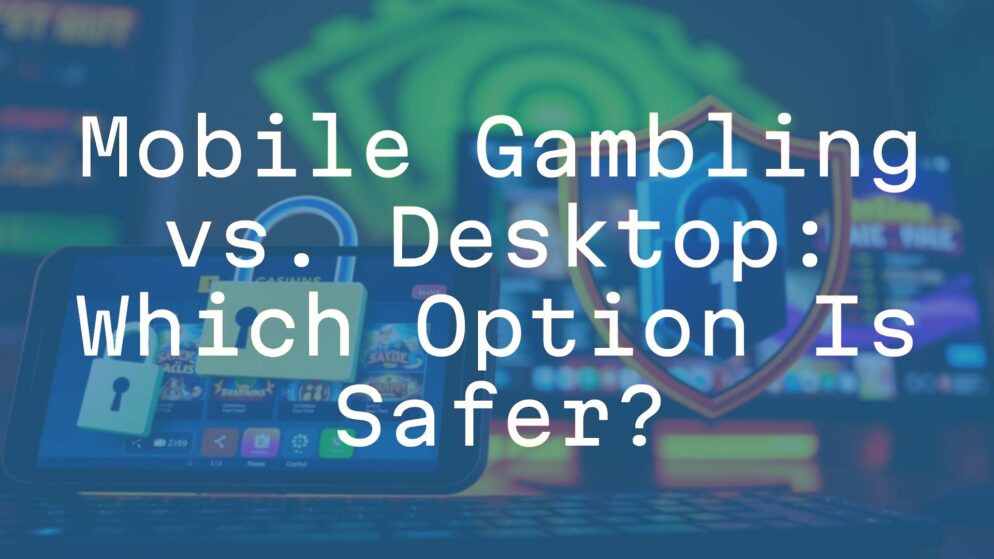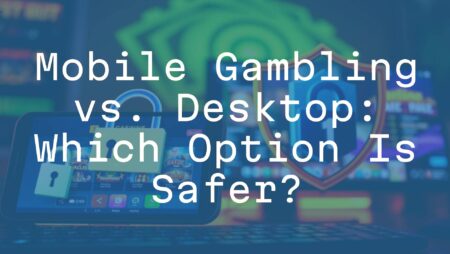

Online entertainment keeps changing, and many players ask whether mobile or desktop gambling is safer. The short answer: neither is safer by default. Safety depends on your habits, the trustworthiness of the gambling site, and the protections the site and device use. Both mobile and desktop have strengths and weak points. A safe experience comes from smart choices and steady habits, not the device alone.
How people play has shifted toward mobile. In the past, rules meant visiting casinos in person. The internet brought casino games into homes. Now smartphones act like small computers, so playing anywhere is easy and common. That same convenience adds new security issues you need to manage to keep your money and personal data safe.

How Security Concerns Differ Between Platforms
Key risks on both mobile and desktop focus on protecting personal data, payments, and fair play. But the ways attackers try to break in can differ. Mobile devices, because they travel with you and stay online, face extra risks from public Wi-Fi, app permissions, and physical loss or theft. Desktops, while more controlled, can be hit by browser attacks, phishing, and gaps in the operating system’s defenses.
Knowing these small differences matters. Mobile screens can hide settings inside menus, so you might miss important security options. The ease of mobile can also lead to casual habits, like logging in on an open network. On a desktop at home, you may be more careful. Both platforms need active care, but the steps you take will differ by device.
What Users Should Look for in Safe Online Gambling
No matter which device you use, stick to the same basics:
- Only use licensed, reputable gambling sites or apps (for example, licensed by the UK Gambling Commission or Malta Gaming Authority).
- Check for strong encryption (SSL/TLS) to protect data while it’s sent between you and the site.
- Read the privacy policy to see what data is collected, how it’s used, and if it’s shared.
- Look for independent audits and positive reviews from trusted industry sources.
These points form the base of safe online play, whether on mobile or desktop.
How Does Mobile Gambling Security Work?
Mobile gambling security combines several tools that protect users on phones and tablets. As smartphones have grown more powerful, casino apps from trusted brands have also added better protections. At the same time, mobile play brings its own risks that you should know and limit.
Because most people keep a phone within reach, gambling can feel as easy as unlocking the screen. That ease calls for more attention to safety. From install to every bet or cashout, there should be multiple layers working to protect your account and data.
Encryption Standards in Mobile Gambling Apps
Strong encryption sits at the core of secure mobile play. Good casino apps use 256-bit SSL or TLS to scramble data sent between your device and their servers. This keeps logins, payment details, and other private info unreadable to anyone who tries to intercept it.
Without encryption, logging in would be like sending your secrets on a postcard. Most legit apps use encryption, but some smaller or shady operators may skip it. Always check the app’s website, privacy policy, or terms for clear mentions of SSL/TLS. If you use a mobile browser, look for the padlock and “https.” Third-party security badges and audit mentions also signal stronger protection.
Biometric Logins: Fingerprint and Face ID Protection
Many mobile casino apps support biometric login. Fingerprint and face scans make it quick and safer to access your account without typing complex passwords. These checks are personal and hard to copy, unlike simple passwords.
No method is perfect-wet fingers can fail, and rare cases of face ID bypass exist-but adding biometrics makes unauthorized access much harder. This extra layer matters for apps that store payment methods or large balances.
App Permissions and Data Tracking Risks
Casino apps may ask for permissions during install. Some, like location, are needed to follow local laws. Others, like access to contacts or photos, may not be needed and can raise privacy concerns.
- Prefer apps that ask for the fewest permissions possible.
- Review permissions during install and recheck them later in your settings.
- Be cautious about apps that want broad access without a clear reason.
Many apps also track usage to improve services, detect fraud, or market to players. That can help the app run better, but it also builds a detailed view of your behavior. Clear privacy policies that explain what is collected and why are a good sign. Vague or missing details are a warning.
Risks of Public Wi-Fi and Unsecured Networks
Mobile play often happens on the move, and public Wi-Fi in cafes, airports, and hotels is risky. These networks can be open or poorly secured, letting attackers intercept data or set up fake hotspots.
Avoid logging in or making payments over public Wi-Fi. If you must, use a VPN to encrypt your traffic. Mobile data from your carrier is usually safer than open Wi-Fi, but the best choice is a private, secure network at home or work.

How Does Desktop Gambling Security Work?
Desktop play remains popular and brings different safety tradeoffs. Security on desktops leans on the operating system, browser, and your setup. Keeping your computer healthy and up to date is a big part of staying safe.
Many players like the bigger screen and steady setup on a desktop. That does not automatically mean better security. You still need to know the common risks and the protections that limit them.
Encryption and Secure Connections on Desktop
Encryption protects desktop play too. Trustworthy sites use SSL/TLS, shown by a padlock and “https://” in the address bar. This scrambles your data so attackers can’t read it if they intercept it.
If a site lacks these signs, treat it as unsafe. Keep your browser and operating system updated, since updates often fix new security holes. Old software leaves you open even if the casino site is safe.
Password Practices and Account Security
Strong account habits matter on desktop:
- Create long, unique passwords with letters, numbers, and symbols.
- Use a different password for each gambling site or app.
- Turn on two-factor authentication (2FA) when offered.
- Change passwords on a schedule and avoid reusing old ones.
- Watch for phishing emails and fake sites that try to steal your login.
2FA adds a second step-like a code from an app or SMS-so a stolen password alone won’t grant access.
Firewall and Antivirus Advantages
Desktops can run strong security tools. A well-set firewall filters network traffic and blocks suspicious connections. Good antivirus and anti-malware tools find and remove harmful software that can steal data or disrupt play.
Keep these tools updated so they catch new threats. Mobile devices offer some built-in protection, but desktop security apps usually give you more control and options.
Risks of Browser-Based Gambling
Browser play is handy but adds risk. Unpatched browsers can be exploited. Fake sites can mimic real casinos and steal logins. Some sites try to install unwanted software.
- Update your browser and plugins.
- Only use needed extensions from trusted developers.
- Review extensions often and remove those you no longer use.
- Clear cache and cookies on a schedule to reduce tracking.
Comparing the Main Security Risks: Mobile vs. Desktop
Both platforms share the goal of protecting your data and money, but the weak spots differ. Knowing where each is exposed helps you focus on the right precautions.
| Risk Area | Mobile | Desktop |
|---|---|---|
| Network safety | Often used on public Wi-Fi; higher risk if no VPN | Usually home/office networks; lower public Wi-Fi use |
| Malware source | Untrusted app stores, sideloaded APKs | Malicious downloads, email attachments, exploit sites |
| Account access | Biometrics common; device theft risk higher | 2FA common; physical theft less likely but still possible |
| Privacy | App permissions and tracking | Browser tracking, cookies, extensions |
| System defenses | Built-in OS protections; limited security app choice | Broader choice of firewalls and antivirus tools |
Malware, Phishing, and Hacking Threats
Malware, phishing, and hacks affect both platforms, but show up in different ways. On desktops, malware often arrives through bad downloads, shady email attachments, or risky sites. A good antivirus and careful browsing help a lot. Attackers also look for bugs in the OS or browser, or they try passwords that leaked from other sites.
On mobile, malware can come from unofficial app stores or sideloaded files. Phishing can arrive by SMS or messaging apps. iOS and Android have strong built-in protections, but the huge app ecosystem and ease of downloading raise exposure. On both platforms, be careful about what you install and what you click.
Privacy Issues and Data Vulnerability
Privacy risk is real on both. On desktops, tracking often happens through cookies and scripts. Review your browser privacy settings and use privacy tools if you want extra control.
On mobile, app permissions and tracking add more layers. Apps may ask for location, contacts, or storage access. Even trusted apps collect usage data. Lost phones also expose data if not locked. Use a strong passcode, biometrics, and limit permissions to what’s necessary.
Physical Device Theft and Unauthorized Access
Phones and tablets are easy to lose or steal, so mobile gamblers face higher physical risk. A desktop usually stays put, so theft is less common, though still possible.
Protect mobile devices with a long passcode, biometrics, and remote-wipe features. This limits damage if the device is taken. For desktops, keep strong OS login passwords and secure your home or office space.

How Can Users Maximize Gambling Safety on Any Device?
Whether you prefer a desktop screen or a phone on the go, safety comes from smart choices, steady habits, and using built-in protections well. The site’s security matters, and so do your actions.
Good gambling sites add strong protections, but you also need to play your part to protect your info and money. On any device, lazy habits create the biggest openings.
Tips for Safe Mobile Gambling
- Download casino apps only from the Apple App Store or Google Play. Avoid sideloading APKs.
- Check and limit app permissions. Revisit them in settings over time.
- Avoid public Wi-Fi. If you must use it, turn on a VPN.
- Use a strong passcode, fingerprint, or face ID.
- Turn on device-find and remote-wipe features.
- Keep your phone’s OS and apps up to date.
Tips for Secure Desktop Gambling
- Install a reliable antivirus and keep a firewall active.
- Update your operating system and browser as soon as updates are available.
- Use strong, unique passwords stored in a trusted password manager.
- Enable 2FA wherever possible.
- Watch for phishing. Check URLs before entering any login info.
- Play only on licensed sites with “https://” and a padlock icon.
Which Is Safer for Online Gambling: Mobile or Desktop?
There is no simple winner. Both mobile and desktop have come a long way, offering strong protections and their own weak spots. Your safety depends most on the site’s security, your personal habits, and where and how you play.
In 2025, rules are shifting and access is easier than ever. Players can choose the device that fits their style. Phones are leading in convenience, but desktops still appeal to many and are not going away.
What Experts and Research Suggest
Security pros say neither platform is safer by nature. Strong protection depends on the quality of the casino’s setup and the user’s care. Good casino brands secure both their apps and websites with SSL/TLS and safe server setups. The key differences come from how devices are used.
Phones gain from biometrics and strict app sandboxing, which can limit malware spread. But they are used more on open Wi-Fi and are easier to lose. Desktops offer more control over firewalls and antivirus, but face more browser attacks and risky downloads. Studies show human error and relaxed habits often cause the biggest problems on any device.
Factors That Affect Personal Security
Your safety depends on several choices you control:
- Pick licensed, well-reviewed sites and apps that clearly explain security and privacy.
- Use a secure home network for deposits and withdrawals.
- Use strong passwords and 2FA to block unauthorized access.
- Keep your OS, browsers, casino apps, and security tools updated.
- Stay alert to phishing, malware, and unsolicited messages.
- On mobile: limit permissions and lock the device. On desktop: use good security software and careful browsing habits.
Safety is not a device feature. It comes from using many layers of protection together.
Key Takeaways on Gambling Security Across Devices
Online gambling keeps growing and changing, and the safety debate between mobile and desktop continues. Both beat old in-person-only options for convenience, but neither is automatically safer. Real safety comes from clear steps taken by casino operators and, most of all, by you.
Better chips in phones and strong encryption keep raising the bar, and in 2025 many players love the speed of opening an app and playing. Still, attackers adapt too. Your best bet is steady care: stay informed, choose trusted platforms, and apply good security habits every time you play. That way, the excitement stays in the game, not in dealing with a breach.








